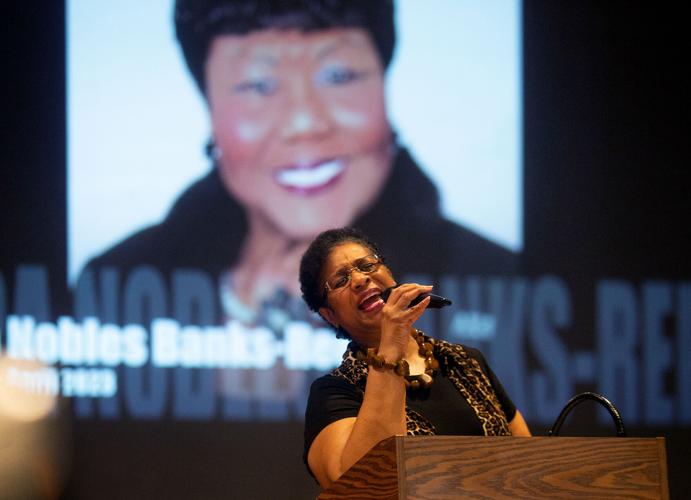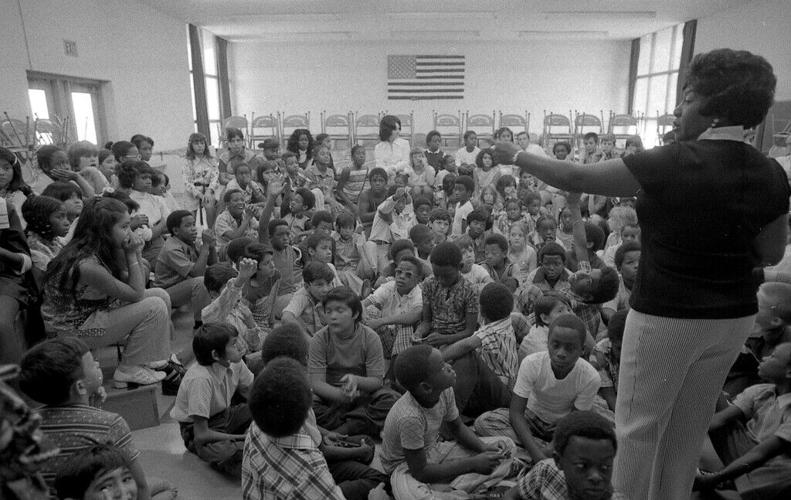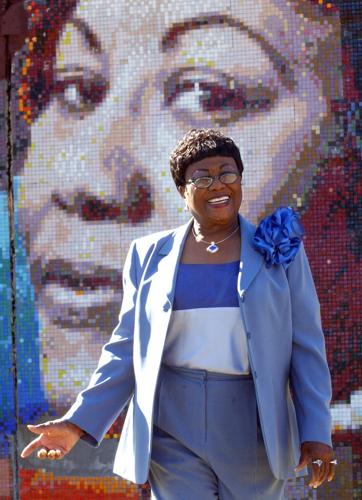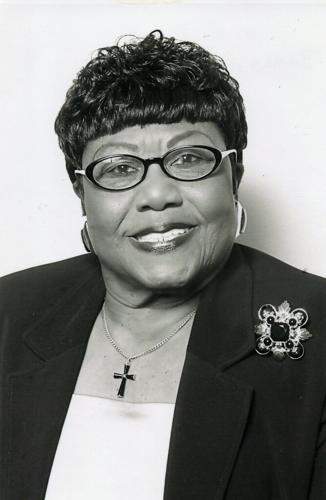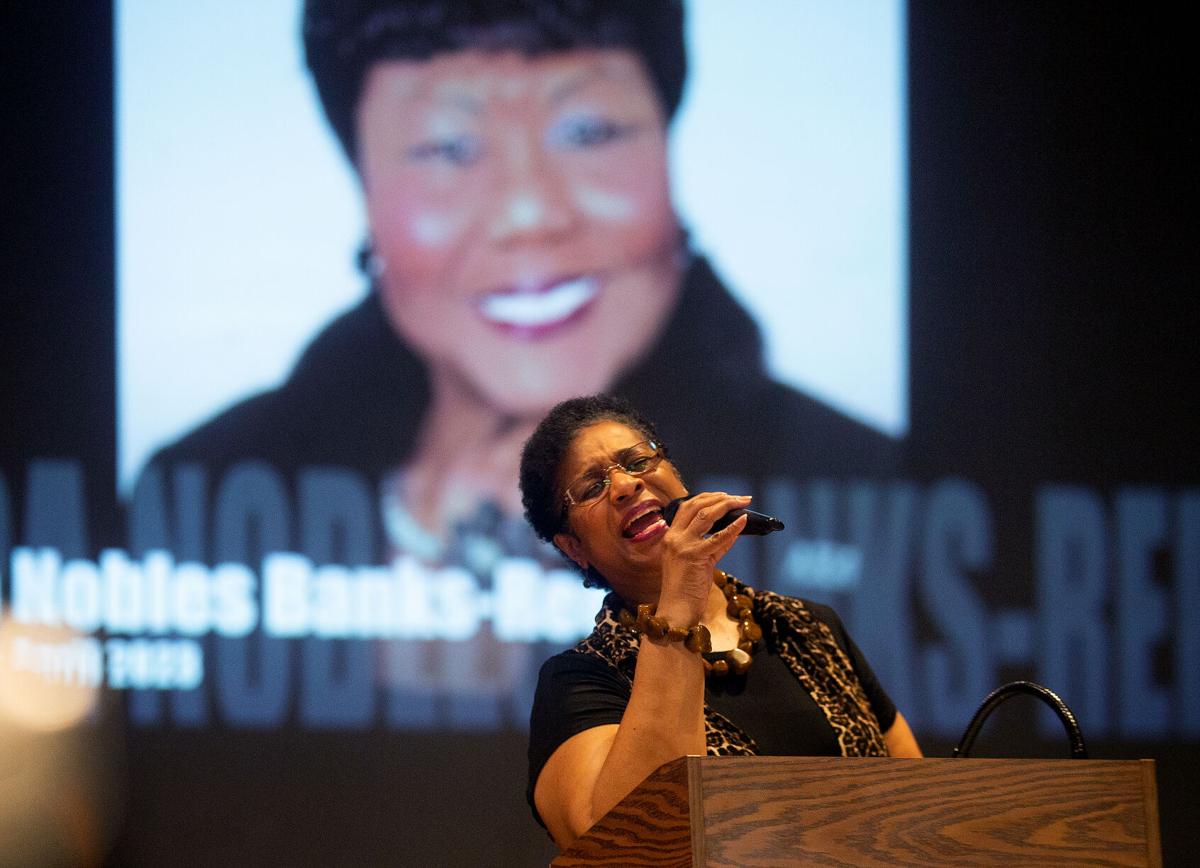Laura Nobles Banks-Reed helped change the face of education in Tucson, after growing up, attending school and teaching students in what was then a segregated city.
The public schools pioneer and civil rights activist died in San Antonio, Texas, on April 14. She was 101.
About 100 friends, family members and former students gathered to remember her Friday at the Dunbar Pavilion, an African American cultural center that now operates out of what used to be Tucson’s only school for Black students during segregation.
Banks-Reed attended the Dunbar School as a child, then returned there to teach in 1943, eight years before Tucson Unified School District agreed to desegregate the school.
“So many of us learned so much from her,” said Doris Snowden, a board member with the Tucson chapter of the NAACP.
El Charro Café owner Carlotta Flores came to Friday’s remembrance with a spread of donated Mexican food and fond memories of her dear friend Laura.
She said she was a young mother working herself to the bone when Banks-Reed took her under her wing, inviting her to join her on some local boards where she could do some good and expand her profile in the community.
Flores said there are a lot of upstanding citizens in Tucson who got to where they are because “they met Laura on the road to their own successes.”
Larry Starks is president of the Tucson Juneteenth Festival Committee, but in the early 1970s, he was a student at Cavett Elementary School.
He said the woman he knew then as Principal Banks used to hand out inspirational, wing-shaped pins — and the occasional, well-earned paddling — to the students she called into her office.
“She instilled such a sense of pride in us at that school,” Starks said. “I’m a better man because of her.”
‘Noblesville’
She was born Laura Nobles in Tucson on June 29, 1921. She grew up with nine siblings and her parents, James and Missouri Nobles, in a big house in Barrio Anita, then an enclave for minorities excluded from living in white neighborhoods.

Then-Principal Laura Banks-Reed speaks to fourth, fifth and sixth graders at Cavett Elementary School on Sept. 5, 1973.
Her grandmother and a host of her aunts, uncles and cousins lived nearby along the same block of Anita Avenue and Contzen Avenue.
“That little area, they used to call it Noblesville,” said Banks-Reed in an oral history she recorded last year, at age 100, about her life in Tucson for the African American Museum of Southern Arizona.
Her father worked for the Southern Pacific Railroad for more than 30 years, and the family traveled the country on the rail passes he would earn.
After graduating from Tucson High School in 1939, Banks-Reed enrolled at the university, where she planned to double-major in elementary education and physical education. There was just one problem, she said: Her P.E. degree required practical work in swimming, “and they didn’t allow us Blacks to go in the pool at the University of Arizona.”
But that soon changed. Banks-Reed said it was her and her mother who convinced the head of the department to drop that Jim Crow-era rule once and for all.
With degrees in hand, she began a long and illustrious career with TUSD, first at the Dunbar School and then as a teacher at Davis Elementary back in Barrio Anita.
She married Jack Banks in 1950, and the two of them opened a barbecue restaurant they called Jack’s Across the Tracks on Fourth Street and Ninth Avenue. They eventually changed the name to Jack’s Original Bar-B-Q and moved the business several times before settling in on 22nd Street near Craycroft Road.
A hysterectomy kept her from having kids of her own, but she made peace with that. “I said, ‘That’s fine, I’ll just use all my energy for helping to take care of other people’s children.’ And that’s what I have done throughout my life,” she recalled.

Laura Banks-Reed jokes with friends in 2004 in front of a mural depicting her more than 20 years earlier, when she was principal of Cavett Elementary School. The mural in at David G. Herrera and Ramon Quiroz Park was dedicated to key figures in the history of Barrio Anita, where Banks-Reed grew up.
Banks-Reed also devoted her time to community activism, serving two terms as the president of the local YWCA and two terms as president of the local NAACP chapter. She was the first woman to hold that job, and she helped lead the civil rights organization in its fight to force Tucson restaurants to seat and serve Black customers.
She eventually became the first Black woman from Arizona to be named to the YWCA’s national board, one of many race and gender barriers she broke. She used her 11 years on the board to advocate on behalf of other women and people of color.
Love and legacy
Banks-Reed returned to the UA for a master’s degree in education in 1966, and she became the principal at Cavett in 1969.
After that, she was promoted to coordinator of TUSD’s reading program and earned two more university degrees — the first as an educational specialist in 1970, the second a Ph.D. in education in 1980.
The University of Arizona College of Education made this video about the life of Dr. Laura Banks-Reed in 2019, when she was honored as the college's alumna of the year.
She retired from Tucson’s largest school district in 1982, after serving as its first Black assistant superintendent.
Her husband, Jack, retired from the restaurant business a decade later, and the two moved to the San Antonio suburb of Helotes, Texas, where he died in 1998 at age 84.
She found love again in 2006, when her wartime sweetheart, Eugene Reed, tracked her down more than 60 years after they first met in Tucson.
He was a young airman at Davis-Monthan, and she was a USO hostess he couldn’t forget. In the end, they got to spend just over 10 years together, before he died on his 97th birthday in 2017.
Banks-Reed was a devout Christian and a long-time member of the Mount Calvary Missionary Baptist Church in Tucson. She credited her activism and her devotion to God to her mother, who she described as a “trailblazer” and an active member of both Mount Calvary and the NAACP.
“I think that’s where I got most of my interest in trying to do something to help other people,” she said in her oral history. “It seems, as I review my life, that I’ve always been that kind of person. If I have something or if I’m somewhere, I’m going to open the door so that another Black person can come in.”
Tucson will soon be home to two buildings with Banks-Reed’s name on them.
TUSD dedicated Laura Nobles Banks Elementary School, off Bopp Road on the west side of the Tucson Mountains, in her honor in 2003.
The University of Arizona College of Education made this video about the life of Dr. Laura Banks-Reed in 2019, when she was honored as the college's alumna of the year.
Then in January of this year, the YWCA of Southern Arizona announced plans to establish the Dr. Laura Banks-Reed Center for Gender and Racial Equity to honor her service and further the organization’s mission of eliminating racism and empowering women.
“I always wanted to make a difference,” Banks-Reed said. “I wasn’t doing it to get my name here or there. I didn’t ever even think about that part of it. I just wanted to make the world I lived in a little bit better place.”
Photos: Laura Banks-Reed, public education pioneer, dies at 101 years old.
Dr. Laura Banks-Reed
Updated
Delois Pierson sings “Wings Beneath my Wings” during a celebration of life for Dr. Laura Banks-Reed at Dunbar Pavilion on April 28, 2023.
Dr. Laura Banks-Reed
Updated
Doris Snowden, left, and Donna Liggins bow their heads in prayer during a celebration of life for Dr. Laura Banks-Reed at Dunbar Pavilion on April 28, 2023.
Dr. Laura Banks-Reed
Updated
Sundi Williams speaks during a celebration of life for Dr. Laura Banks-Reed at Dunbar Pavilion. Williams and members of the Alpha Kappa Alpha Sorority, Inc. paid tribute to Banks-Reed, she was a member of the sorority.
Dr. Laura Banks-Reed
Updated
Friends and community members came together to celebrate the life of Dr. Laura Banks-Reed at Dunbar Pavilion.
Dr. Laura N. Banks-Reed
Updated
Dr. Laura N. Banks-Reed
Dr. Laura N. Banks-Reed
Updated
A 350-foot long mosaic mural, depicting the stories and heroes of Barrio Anita was unveiled at David G. Herrera and Ramon Quiroz Park in 2004. Here, Laura N. Banks jokes with friends in front of a part of the mosaic depicting her more than twenty years earlier, when she was principal of Cavett Elementary School. Banks was born and raised in Barrio Anita, and was thrilled to be included in its history.
Dr. Laura N. Banks-Reed
Updated
Principal Laura Banks with 4, 5, and 6th graders at Cavett Elementary School. Arizona Daily Star file photo taken 9/5/73 by Art Grasberger.


